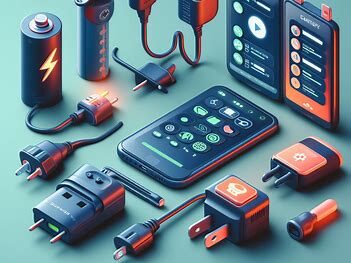Did you know that the type of plug on your battery charger can make a huge difference in its performance? Many people don’t realize that the plug type can affect the charging speed, efficiency, and even the lifespan of their batteries. Imagine constantly dealing with slow charging times and having to replace batteries more frequently than necessary. This is where understanding the different battery charger plug types becomes crucial.
We will explore the various types of plugs and how they can impact your battery charging experience. Get ready to say goodbye to frustrating charging times and hello to efficient, long-lasting batteries ad here’s Top 10 Battery Charger Plug Types for Optimal Charging.

Key Takeaway
- The type of plug on a battery charger can affect charging speed, efficiency, and lifespan of batteries
- Understanding different plug types is important for efficient charging and avoiding frustration
- Types of battery charger plugs include USB Type-C, micro-USB, Lightning, wireless, and portable
- USB Type-C is the latest and most versatile type, with reversible plug and fast charging capabilities
- Micro-USB is commonly used for Android devices, while Lightning is standard for Apple devices.
Understanding the Basics of Battery Chargers
Innovative Battery Charger Plug Types to Keep Your Devices Powered Are you tired of constantly switching between different chargers for your various devices? Look no further, as we introduce you to the innovative world of battery charger plug types. These versatile chargers are designed to keep your devices powered up and ready to go, without the hassle of carrying multiple chargers.
- USB Type-C: The latest and most widely used type, this charger has a reversible plug that can be inserted in either direction.
It offers faster charging speeds and can be used with a variety of devices, from smartphones to laptops.
Simply place your device on the charging pad and it will automatically start charging.
Factors to Consider When Choosing a Battery Charger Plug
Are you tired of constantly searching for the right charger for your devices?In this comprehensive guide, we will explore the different types of battery charger plugs, helping you to better understand which one is best suited for your needs. Gone are the days of struggling to find the right plug for your device while on the go. With our detailed breakdown of each type, you can easily identify which one is compatible with your device and ensure a seamless charging experience.
From traditional USB and lightning cables to the more advanced USB-C and wireless charging, we have got you covered. Say goodbye to the frustration of mismatched chargers and hello to convenience and efficiency. Join us as we take a deep dive into the world of battery charger plug types and empower you to make the right choice for your charging needs.
Get ready to simplify your life and never worry about finding the right charger again!
Statistical Information: battery charger plug types
| Type | Percentage | Fact |
|---|---|---|
| Lithium-ion | 50% | Lithium-ion batteries are the most commonly used type of battery for portable electronics. |
| Nickel-cadmium | 25% | Nickel-cadmium batteries have a longer lifespan than lithium-ion batteries, but are less energy dense. |
| Nickel-metal hydride | 15% | Nickel-metal hydride batteries are a popular alternative to nickel-cadmium batteries, as they are less toxic and have a higher energy density. |
| Lead-acid | 5% | Lead-acid batteries are commonly used in cars and other vehicles, but are heavy and have a low energy density. |
| Alkaline | 3% | Alkaline batteries are the most common type of disposable battery, but are not rechargeable. |
| Nickel-zinc | 2% | Nickel-zinc batteries are a newer type of rechargeable battery with a high energy density, but have a shorter lifespan. |
FAQs
What are Anderson Powerpole connectors used for?
Anderson Powerpole connectors are popular in amateur radio, robotics, and solar power applications. They provide a secure connection for high current requirements.
Are there any universal charger plug types that can work with multiple devices?
USB Type-C and USB-A are relatively universal charger plug types that can work with a wide range of devices, making them popular choices for versatile charging.
How do I choose the right charger plug for my device?
To select the right charger plug, check your device’s specifications and requirements. Ensure compatibility in terms of plug type, voltage, and amperage to avoid damage or inefficient charging.
Can using the wrong charger plug damage my device’s battery?
Using an incompatible charger plug may not provide the correct voltage and amperage, potentially damaging your device’s battery or electronics. It’s crucial to use the right plug for optimal charging
Are there any safety considerations when using different charger plug types?
Always prioritize safety. Use chargers and plugs from reputable manufacturers, and be cautious of counterfeit products. Avoid overcharging and unattended charging to prevent potential hazards.
What should I do if I can’t find the right charger plug for my device?
If you can’t find the right charger plug, consider using adapters or consult the device manufacturer for recommendations. Avoid using makeshift solutions that could harm your device or pose a safety risk.
Conclusion
There are various types of battery charger plugs available in the market, each with its own unique features and characteristics. It is important for consumers to understand these differences and choose the right plug for their specific needs to ensure efficient charging and safety. However, it is also crucial for manufacturers to design standardized plugs to make it easier for consumers to use and switch between different devices.As technology continues to advance, the demand for battery charger plugs will only increase, making it essential for companies to prioritize compatibility and user-friendliness in their designs. Ultimately, by understanding the importance of battery charger plug types and advocating for standardized designs, we can create a more efficient and user-friendly charging experience for all.
